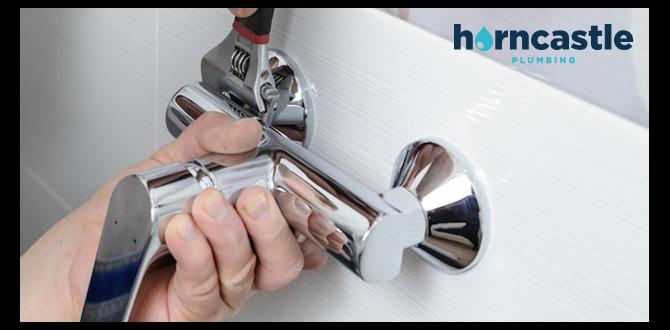Imagine this: you turn on the faucet, and nothing happens. The water just won’t go down. A backed up sink can be really frustrating. But don’t worry; it’s a common problem. Most people face this at some point. The great news is that you can fix a backed up sink yourself!
Have you ever seen a plumber on TV, confidently tackling a messy situation? You can be like them! With just a few simple tools and the right steps, you can save the day. The best part? You don’t need to call an expert right away.
In this article, you’ll discover easy ways to fix a backed up sink. Whether it’s caused by hair, soap, or something else, we’ve got you covered. Let’s get started and help your sink flow freely again!
How To Fix A Backed Up Sink: Step-By-Step Guide

How to Fix a Backed Up Sink
Got a sink that won’t drain? You’re not alone! Many people deal with this messy situation. Start by checking the drain for clogs. You might only need a plunger or a simple bent wire. If that doesn’t work, a mixture of baking soda and vinegar can break down stubborn gunk. In stubborn cases, a plumbing snake may be necessary. Remember, regular maintenance helps prevent backups. Fixing your sink quickly saves time and avoids bigger plumbing bills!Understanding the Causes of a Backed Up Sink
Common reasons for sink backups. Recognizing signs of a clogged sink.Sometimes, sinks have a mind of their own! Common reasons for backups include food scraps, grease, and soap buildup. Believe it or not, even hair can join the party. A slow-draining sink? That’s like the sink saying, “Help me!” If water starts bubbling or makes weird gurgling sounds, it’s signaling trouble ahead. Ignoring it? You might officially join the ranks of “Extreme DIYers” with a very messy floor!
| Cause | Signs |
|---|---|
| Food Scraps | Slow drainage |
| Grease | Gurgling sounds |
| Soap Buildup | Water pooling |
| Hair | Smells from the drain |
Tools and Materials Needed for the Repair
Essential tools for unclogging a sink. Recommended products for drain cleaning.To rescue your sink from a watery disaster, you’ll need some trusty tools! Grab a plunger; it’s like the superhero of clogs. A drain snake can help you reach deeper issues. You might also want rubber gloves to keep your hands clean, because no one enjoys the “yucky” stuff. And don’t forget some drain cleaner to give those pesky pipes a good scrub!
| Tool/Material | Purpose |
|---|---|
| Plunger | Unclogs sinks with a mighty push! |
| Drain Snake | Reaches deeper clogs, like a rescue mission! |
| Rubber Gloves | Protects hands from gunky messes. |
| Drain Cleaner | Helps dissolve stubborn blockages. |
Step-by-Step Process to Unclog a Sink
Initial assessment and safety precautions. DIY methods for clearing the blockage.Before starting, take a look at your sink. Check for any visible clogs or issues. Safety comes first! Wear gloves and have a towel nearby. This helps keep everything clean.
There are a few simple methods to clear the blockage:
- Use a plunger. It can create pressure to push the clog away.
- Try hot water. Pour it down the drain to dissolve grease.
- Make a vinegar and baking soda mix. This bubbly reaction can break down debris.
These methods are easy and can save you time!
What should I do first before unclogging a sink?
Perform an initial assessment to check for visible blockages. Wear protective gloves for safety and keep a towel handy to clean any spills.
When to Call a Professional Plumber
Indications that professional help is needed. Costs and expectations for hiring a plumber.Sometimes, you can’t fix a backed-up sink alone. Look for these signs to know when to call a pro:
- Water pools around your sink.
- Draining is slow even after a cleaning.
- Foul odors come from the drain.
Hiring a plumber costs between $100 to $300, depending on the problem. Expect them to fix issues quickly and with care.
It’s better to seek help than to make the problem worse. A good plumber can save you time and stress.
When should you call a plumber?
Call a plumber if you see signs of sewage backup, like strong smells or unsightly stains. Professional help is key for serious blockages.
Preventive Measures to Avoid Future Backups
Daily habits to maintain sink drainage. Recommended drain cleaning techniques.Keeping your sink flowing smoothly is easy with good habits. Always rinse food scraps down the disposal instead of tossing them in the sink. Also, avoid pouring grease—it’s like inviting a clog to a dance party! Regularly use baking soda and vinegar for a refreshing clean, too. Flush hot water down the drain weekly to wash away soap and debris. Try this table for daily tips:
| Tip | Description |
|---|---|
| Rinse Properly | Don’t leave food bits behind! Rinse plates before washing. |
| Avoid Grease | Don’t let grease party in your pipes! |
| Weekly Clean | Use baking soda and vinegar for extra sparkle! |
Following these tips can help you avoid messy backups and keep your sink happy!
Alternative Solutions for Persistent Clogs
Chemical vs. natural drain cleaners. Importance of regular maintenance.Clogs can be stubborn, but you have options. Chemical drain cleaners are strong and quick but can harm pipes. Natural cleaners, like baking soda and vinegar, are safe and good for the environment. Regular maintenance is key! Cleaning drains regularly helps prevent big problems later. You can try:
- Flushing with hot water every week.
- Using a drain strainer to catch hair and food.
- Pouring vinegar and baking soda monthly.
Keep your sink happy and flowing!
Can chemical drain cleaners harm pipes?
Yes, chemical drain cleaners can damage pipes over time. They are strong and can lead to leaks.
What is a simple way to prevent clogs?
Regular cleaning and using strainers can help. This way, you stop clogs before they start!
FAQs About Backed Up Sinks
Common yet unanswered questions on sink issues. Tips for quick fixes in emergency situations.Many people wonder about backed up sinks. Here are some common questions and quick tips for emergencies.
What causes a sink to back up?
Food waste, hair, and soap can block pipes. A sink also might clog due to old plumbing. Regular cleaning helps prevent this.
How can I fix a backed-up sink quickly?
Use a plunger or baking soda and vinegar. Here are some steps:
- Clear away any standing water.
- Pour in baking soda followed by vinegar.
- Wait a few minutes, then flush with hot water.
When should I call a plumber?
If the sink is still clogged after trying, call a plumber. They have special tools that can help.
Knowing these tips can save your day and keep your sink running smoothly!
Conclusion
In conclusion, fixing a backed-up sink is simple. You can start by clearing out the drain and using a plunger. If that doesn’t work, try a plumbing snake or baking soda and vinegar. Always remember to check the garbage disposal for clogs. If you need help, don’t hesitate to call a plumber. With these steps, you’ll keep your sink flowing smoothly!FAQs
What Are The Common Causes Of A Backed-Up Sink, And How Can They Be Diagnosed?A backed-up sink often happens because of clogs. Food bits, grease, or hair can block the drain. You can check for clogs by removing the drain cover and looking inside. If you have a plunger, you can try using it to push the clog away. If that doesn’t work, you might need help from a plumber.
What Tools And Materials Do I Need To Fix A Backed-Up Sink?To fix a backed-up sink, you’ll need a few tools and materials. First, get a plunger to push the blockage. You might also need a wrench to loosen pipes. A bucket can catch any water that spills out. Lastly, having some gloves and a flashlight can help keep things clean and bright while you work.
How Can I Safely Unclog My Sink Using A Plunger Or A Drain Snake?To safely unclog your sink, first, make sure you have a plunger or a drain snake. If you use a plunger, cover the overflow hole with a wet cloth. Then, push down and pull up on the plunger quickly for 15-20 seconds. If this doesn’t work, you can use a drain snake. Insert it gently into the drain and twist it to grab the clog. Pull it out slowly. Always wear gloves to keep your hands clean!
What Are Some Diy Methods To Clear A Sink Blockage Without Using Harsh Chemicals?You can try using baking soda and vinegar. First, pour some baking soda down the sink. Then, add vinegar on top. After a few minutes, rinse it with hot water. You can also use a plunger to push the blockage away. Just cover the sink and pump it up and down!
When Should I Consider Calling A Professional Plumber For A Backed-Up Sink Issue?You should call a professional plumber if your sink is still backed up after trying to fix it yourself. If water is running over the edge and making a mess, get help. Also, if you smell bad odors or see leaks, it’s time to call. Plumbers have special tools to clear the problem safely. Remember, it’s okay to ask for help!








